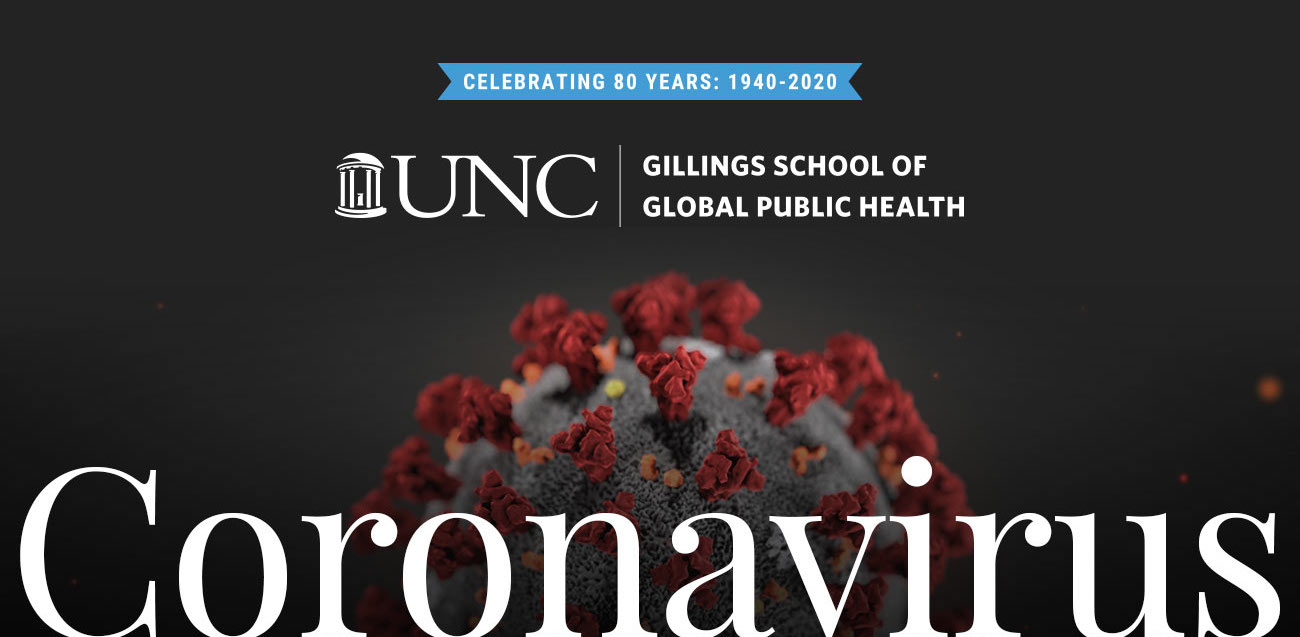The Gillings Community Responds to COVID-19: Equipment, Emergency Response and Water Surveillance

April 3, 2020
The challenge that COVID-19 poses across the globe epitomizes the importance of public health education and research. At the UNC Gillings School of Global Public Health, students, alumni and faculty from across disciplines are working tirelessly to put learning into action in the face of a global health crisis.
Health policy and management student makes face shields for health care workers
Alex Gertner – who is a doctoral student in health policy and management at the Gillings School, as well as a student at the UNC School of Medicine – is working alongside fellow students and experts at Triangle universities to address the shortage of personal protective equipment (PPE) for healthcare workers in North Carolina.
Gertner and his classmates saw the impact COVID-19 had on states around the country and anticipated that it would reach their home state as well. The team first created PPE prototypes with materials from local stores like Home Depot and Jo-Ann Fabric before being connected with the BeAM makerspaces on UNC’s campus. There, they worked with experts in engineering and design from UNC, Duke and NC State to develop a face shield that could be mass-produced quickly and efficiently by BeAm facilities.
Production of face shields for health providers has started at @UNC_BeAM with help from @UNC_SOM medical students. pic.twitter.com/nnw9EAelUc
— Alex Gertner (@gertner_alex) March 28, 2020
The collaboration of healthcare and engineering expertise, driven by compassion in the midst of a pandemic, will allow the team to produce 40,000 face shields for health care workers on the front lines of the COVID-19 response.
Master of Public Health alumna helps to mobilize COVID-19 response in New York City
Pooja Jani, MD, MPH, graduated from the UNC in 2016 after completing her preventive medicine residency training at the School of Medicine and her Master of Public Health in the Public Health Leadership Program’s health care and prevention track. Soon after, she joined the New York City Department of Health & Mental Hygiene (NYC DOHMH).
In January 2020, Jani was activated under DOHMH’s Incident Command System to support emergency response efforts for COVID-19 in New York City (NYC). During the containment phase of the response, she served as a citywide health emergency field operations medical specialist, where she helped DOHMH to stand up a quarantine operation in collaboration with Centers for Disease Control and Prevention (CDC) to monitor potentially exposed individuals who were returning to John F. Kennedy airport on flights from Hubei, China.
Once DOHMH began to recognize widespread community transmission of COVID-19 in NYC, the agency shifted into the mitigation phase of response efforts. In this current phase, Jani is now serving as chief of staff for the Health Systems Support Branch (HSSB), which is tasked with supporting the entire NYC health care system by integrating its response activities with those in the city, state and federal levels.
Jani sees the most exciting and challenging part of her role in her involvement in increasing hospital surge capacity. Her team is helping to establish alternate care sites across the city, such as the Javits Center operation and the USNS Comfort naval hospital ship. As the local experts of NYC, her team brings knowledge and coordination capabilities with local health care system partners to bear in order to support the State of New York, the Army Corps of Engineers, National Guard, the Department of Health and Human Services (HHS) and the Federal Emergency Management Agency (FEMA) in operationalizing these and other alternate care sites across the city.
Read more about Pooja Jani in our Public Health Leadership Program’s alumni features.
Environmental Sciences and Engineering alumni collaborate on coronavirus monitoring in wastewater
Alumni from the Department of Environmental Sciences and Engineering are working on a research proposal for SARS-CoV-2 surveillance in wastewater. This surveillance will be beneficial in helping to track when and where COVID-19 infections are located, given the limited availability of clinical surveillance and the fact that many infections are asymptomatic.
Scott Meschke (’01 PhD and associate professor at the University of Washington), Christine Stauber (’07 PhD and associate professor at Georgia State University) and Joe Brown (’07 PhD and assistant professor at Georgia Tech) are each leading research teams sampling wastewater for SARS-CoV-2. They are part of a large, informal consortium of other researchers monitoring wastewater in other places to measure where and when coronavirus infections occur.
The teams hope to be able to develop a method for estimating “the denominator,” or the undiagnosed number of COVID-19 cases in a population, which are usually mild or asymptomatic. In most parts of the United States, public health agencies only know about the most serious cases that end up getting tested, and case fatality – that is, the number of those who have died from infection divided by the number of diagnosed with infection – is about 1-4%.
The research teams believe the real case fatality rate may be much lower if they can help estimate the burden of asymptomatic infections, and this work could be crucial to help model the spread of the virus.
See more general information about COVID-19 at the Gillings School’s Coronavirus Information Portal.
Read more about how our faculty and departments are responding to the COVID-19 pandemic in our first feature. And read more about how Gillings students and alumni are responding to the COVID-19 pandemic in our follow-up feature.
Find a roundup of all our experts’ coronavirus-related media outreach in this Twitter moment.
Contact the Gillings School of Global Public Health communications team at sphcomm@unc.edu.
